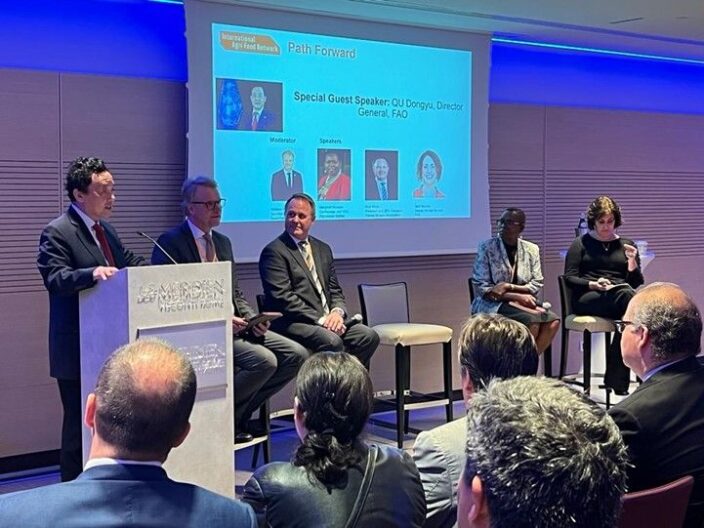 The International Agri-Food Network (IAFN) hosted an event in Rome on May 3rd entitled Partnering 4 Betters. The event brought together UN FAO leadership and private sector representatives to review the agricultural sector’s performance in progressing the four betters:
The International Agri-Food Network (IAFN) hosted an event in Rome on May 3rd entitled Partnering 4 Betters. The event brought together UN FAO leadership and private sector representatives to review the agricultural sector’s performance in progressing the four betters:
- Better Production,
- Better Nutrition,
- Better Environment, and
- Better Life
The Four Betters is a way of thinking about the second of the seventeen Sustainable Development Goals (SDG 2) or Zero Hunger. The official wording for SDG 2 is “end hunger, achieve food security and improved nutrition and promote sustainable agriculture”.
The Event
The event was facilitated by the New York-based consultancy Emerging Ag. I was invited to attend as a Nuffield Farming Scholar (2003), as a Sustainability Consultant and as the 2023 Chair of Irelands National Stakeholder Forum for implementing the SDGs.

FAO Director-General Dr QU Dongyu addressing the Partnering 4 Betters event May 3rd, 2023
FAO Director-General Dr QU Dongyu, Deputy Director Generals Ms Beth Bechdol and Ms Maria Helena Semedo, FAO Chief Economist Mr Maximo Torero, and other senior officials from FAO addressed the gathering.
The one-day meeting consisted of two plenary sessions, six workshops, and a networking lunch highlighting regional investment opportunities. Each plenary session focused on a specific topic, cutting across science, innovation and climate themes.
Rescuing the SDGs
The event opened with a note of urgency (if not despair) that the world was on a rescue mission for the SDGs and that Agenda 2030 is in grave peril as key sustainability metrics continue to move in the wrong direction.
It seems a familiar pattern at many environmental conferences. Everyone knows WHY agriculture needs to change. There is broad-based agreement on WHAT needs to happen to achieve system transformation. This phrase is used freely!
HOW to transform the system
However, everything seems to get stuck on the HOW. There were the usual dichotomies of:
- The negative environmental impact of agriculture is overestimated, and we need better and standardised data. [Of course, there is hidden resistance to having standardised data because transparency is seen as a transfer of power from private to public interests.]
- Agriculture could be more sustainable, but we don’t know how to incentivise farmers or help them to manage the transition risk.
- Agriculture is naturally slow-moving. It is inherently incremental. At a sectoral level – investments are in the multi-billion €/$ category. You have to be sure they work. This isn’t about being resistant to change; rather, it is about being risk-mindful.
- Then to confirm why nothing transformative can happen, it was repeatedly reaffirmed that the entire value chain must shift position together, and there isn’t a mechanism or a collective culture for shifting in lockstep.
The knowledge in the room about the EU Corporate Sustainability Reporting Directive (CSRD), the Sustainable Finance Disclosures Regulation (SFDR) and the overarching EU Taxonomy seemed sparse. This may not be surprising given a significant North American presence, but the EU Green Deal is our best bet for enabling system transformation that causes value chains to shift.
Private vs Public Interests
The event provided little evidence that private interests, left to their own devices, will take the lead in meeting the public interest of rescuing the SDGs. That said:
- Gatherings like this provide an opportunity for relationships to form and trust to build in a pre-competitive setting between market actors and policy-setters.
- It is an opportunity to learn. For example, my attention was drawn to the problems created by supply-side directives (e.g., 20% organic production) that are not balanced by demand-side interventions to support the shift from an output mindset to an outcome mindset.
I was also struck by a passing comment from Mohamed Manssouri, FAO Investment Centre Director, that human capital investment is in the “blind spot of many policymakers…we like to see people doing hard work…but human capital investment is different as it sustains the stream of benefits…. And the announcement of extending the Accelerator Mentorship Programme for Women-led SMEs in Africa, a programme for 50 women in Africa, was very positively received.
FAO as Mediator
The FAO has a fascinating role as a mediator between private and public interests.
It will do well not to become captured by one or the other.

Share this on...